
She may not be a household name here, but Brand is a significant figure in Australian arts history, a pioneer of theatre who was unafraid to lace her stories with radical ideas.
Brand turns 90 today and to celebrate, NIDA and Newtown's New Theatre are hosting a birthday celebration tomorrow night, where her colleagues and friends will offer tributes, and excerpts of her work will be performed.
"I must admit that I do most of my thinking sitting down and either knitting or darning socks. Although darning socks has gone out of style, hasn't it?"
She never set out to change people's minds, but doesn't hide her pride at the thought that she may have done so anyway.
"I think I was just dealing with people and their situations and their problems. I was reading one of my plays for the first time the other day, all about the situation in Malaya," she says, pulling out a copy of her 1950 play Strangers in the Land. It follows a young white woman who travels to British-controlled Malaya and is shocked by her host family's treatment of the locals.
"I haven't heard about Malaya in recent times but I do know they don't have British there any more, owning everything. So when I read it again, I thought, well, I'm glad I did that."
But her main objective, says Brand, was to entertain. "I didn't want to push ideas down people's throats but of course I suppose it worked that way. But the most pleasant feeling was to be sitting in the audience hearing laughter from time to time," she says.
read moresee also
Happy Birthday Mona Brand!.
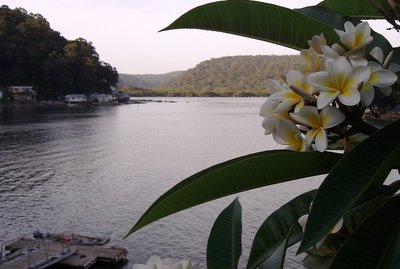 loch and oar!
loch and oar!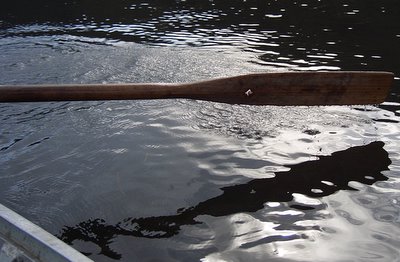

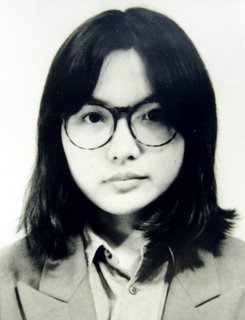 Tetsuro Tanaka being awarded the Tada Yoko Human Rights Award on the 17th of December at Sohyo Kaikan. Tetsuro Tanaka has protested daily outside the gates of OKI in Takao since he was unfairly sacked 24 years ago.
Tetsuro Tanaka being awarded the Tada Yoko Human Rights Award on the 17th of December at Sohyo Kaikan. Tetsuro Tanaka has protested daily outside the gates of OKI in Takao since he was unfairly sacked 24 years ago. We discovered Seville oranges at the green grocers last week (they only appear for about one month each year) so we just had to buy some. Seville oranges means marmalade and 2 Kg makes 11 jars
We discovered Seville oranges at the green grocers last week (they only appear for about one month each year) so we just had to buy some. Seville oranges means marmalade and 2 Kg makes 11 jars ... one jar down ... tastes good! Our recipe was from the 1940s but very similar to this one from The Independent
... one jar down ... tastes good! Our recipe was from the 1940s but very similar to this one from The Independent The Rocks area was earmarked for "development" (bulldozing) back in the 1970s. The members of the NSW Builders Labourers Federation placed a Green Ban on the area which is why it's so refreshing to walk through today!
The Rocks area was earmarked for "development" (bulldozing) back in the 1970s. The members of the NSW Builders Labourers Federation placed a Green Ban on the area which is why it's so refreshing to walk through today!
 Up the road close to Observatory Hill is the Garrison Church, much used for weddings. 150 years ago the stonemasons working on the church downed tools and won an eight hour day, eight hours for work, eight hours for rest, and eight hours for themselves.
Up the road close to Observatory Hill is the Garrison Church, much used for weddings. 150 years ago the stonemasons working on the church downed tools and won an eight hour day, eight hours for work, eight hours for rest, and eight hours for themselves.
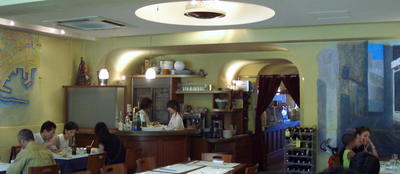
 We tried to go to the famous Marios as recommended in the Lonely Planet but they were full, so we went to another Italian restaurant just round the corner
We tried to go to the famous Marios as recommended in the Lonely Planet but they were full, so we went to another Italian restaurant just round the corner 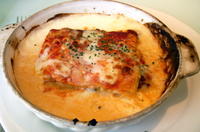 and had a fine spaghetti marinara and lasagne.
and had a fine spaghetti marinara and lasagne. and waited for the Shinkansen to carry us at gliding speed back to Tokyo
and waited for the Shinkansen to carry us at gliding speed back to Tokyo  Paper Cranes are the symbol of Hiroshima so it seemed approprate that we saw two cranes atop the dome
Paper Cranes are the symbol of Hiroshima so it seemed approprate that we saw two cranes atop the dome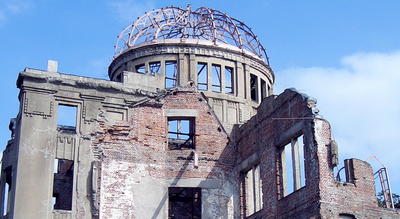
 Hiroshima Peace Memorial Museum
Hiroshima Peace Memorial Museum ... and a contemporary protest against the Iraq War (part of world wide demonstrations on 24th September ... we heard of large demos in Washington, London as well as small ones in Tokyo)
... and a contemporary protest against the Iraq War (part of world wide demonstrations on 24th September ... we heard of large demos in Washington, London as well as small ones in Tokyo) the demand for peace never rests ....
the demand for peace never rests .... .
.